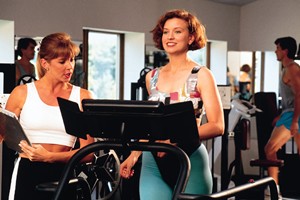|
How Do I Know That's the Right Answer?
Author:
Stan Reents, PharmD
Original Posting:
08/16/2008 07:41 AM
Last Revision: 12/10/2018 05:47 AM
I've had 2 careers in my life so far: The first was a health care professional at a major medical center. My current one can best be described as a combination of a medical journalist and health coach.
These collective experiences have taught me the importance of factual accuracy. In medical care, there simply isn't any room for error when it comes to drug dosing, communicating with physicians and patients, and keeping records. Factual accuracy is also a foundation of journalism and publishing (unless you're talking about Hollywood tabloids!).
Providing fitness and wellness advice to readers and to private clients falls under the same high level of expectation. At least, I think it should.
"HOW DO I KNOW THAT'S THE RIGHT ANSWER?"
One of the problems in the fitness world is what I describe as "the blind leading the blind."
Consider this for a moment: If you don't know the answer to a question, how can you be sure that the answer someone is giving you really is the right answer? This is something you should consider any time someone advises you on a subject you know little about.
Let's use car repair as an example:
Say your car is in the shop to evaluate a leak. After a brief inspection, the mechanic tells you that your automatic transmission is shot and you will need a new one. It's going to cost you $2000. Do you believe him?
Let's assume that, like most of us, you don't know much about automatic transmissions. So, at this point, you have 2 choices: (a) you believe the mechanic is telling you the truth and you let him do the repair, or, (b) you seek a second opinion. But, if you don't know anything about automatic transmissions, even if you get a second opinion, if it matches the first, then you probably conclude that, yes, your transmission really is shot.
What does this have to do with fitness, wellness, and sports nutrition?
It's likely that you may have heard some, or all, of the following statements from so-called fitness "experts":
- "You need to take this protein powder if you want to bulk up."
- "If you want to lose fat from your waistline, you need to do a lot of crunches."
- "Stretching reduces injuries."
- "The ingredients in this supplement are 'natural,' so, therefore, it's safe."
If you're knowledgeable in medicine, pharmacology, exercise physiology, or, even medical informatics, you can easily shoot holes in each of these statements. But, most consumers cannot. So, they are inclined to believe the person handing out the advice.

Certainly, there are a lot of good personal trainers out there. But, it's important that (a) they are properly trained, and (b) they don't venture too far from what they have been trained to do.
Regarding the first point, in 2002, a study from UCLA showed that personal trainers who held an academic degree performed better on a knowledge exam than personal trainers who did not, regardless of the number of years of experience the non-degreed trainers had (Malek MH, et al. 2002). (Several years later, Men's Health magazine picked up on this study and published a scathing article warning of the knowledge deficits of personal trainers.)
Regarding the second point, personal trainers really shouldn't be recommending supplements and offering detailed nutrition recommendations, even though this activity occurs routinely. It's no different than a dentist treating your high blood pressure. Even if no harm occurs, it's not right. The activity is outside the accepted standards of practice for that profession.
VALIDATING INFORMATION SOURCES
Fortunately, there are some ways consumers can determine whether the information (and its source!) is credible.
Validating Verbal Advice
Any time you are given advice -- whether it is legal, financial, health, or fitness advice -- you should carefully evaluate the background of the person providing that advice.
Personal trainers, fitness advisors, and health coaches should hold a current certification by a reputable professional organization, and an academic degree in a health-fitness discipline (Malek MH, et al. 2002). Several reputable organizations that issue certifications for personal trainers include:
- American College of Sports Medicine (ACSM)
- American Council on Exercise (ACE)
- National Academy of Sports Medicine (NASM)
- National Strength and Conditioning Association (NSCA)
Major fitness clubs in the US prefer the personal trainers they hire to hold certifications from groups such as these (Robinson EM, et al. 2006).
Unfortunately, currently in the US, there are dozens and dozens of groups that grant personal trainer certifications, but, with little or no standardization. Consumers have no idea that certifications from some outfits can be obtained so easily. As an analogy, note that in some states, a person can be "certified" as a home inspector after paying a fee and passing a simple test. Does that mean that person truly understands home construction? I don't think so. Personal trainers need to be held to higher standards than that.
In an attempt to resolve this, an accreditation process exists for organizations that issue "personal trainer" certifications. While this may seem like
unnecessary bureaucracy, it is important. For example, most college programs leading to a degree in any of the health sciences are accredited. In fact, candidates who want to obtain licensure to practice in a health-related career cannot even apply for the certifying exam unless they have obtained their degree from an accredited academic program.
Validating Written Advice
The Internet has created a conundrum: On one hand, it makes information delivery much more efficient and widespread. On the other hand, it completely undermines the "peer review process," a critical step in the development of good health and medical information. As a result, we are presently living in an era where blogs, testimonials, and downright hearsay are given the same degree of validity as information that is reviewed much more vigorously.
Research shows that consumers turn first to the Internet when looking for health information and advice, even before initiating a discussion with their personal physician (Hesse BW, et al. 2005). Consumers should look for the following when evaluating written (either web or print) health and/or fitness advice:
• The background and credentials of the author(s) should be evaluated. Is the author qualified to write about that particular topic? For example, I may have an opinion on the proper way to trim trees, but I am not an arborist. Thus, my advice on this topic is not very credible.
• The source of controversial, dogmatic, or less well-known statements should be clarified. Even if the author is qualified to write about the topic, it is still important that controversial, dogmatic, or less well-known statements are supported with evidence. Identification of the source is a hallmark of quality medical and scientific publishing. At the end of these published papers, the sources are cited. An example of a nutrition newsletter for consumers that does a good job of citing the sources of the research they summarize is Nutrition Action, published by the Center for Science in the Public Interest (www.CSPInet.com). However, identifying the original source of the research is rarely done on consumer health/fitness web sites. Health and fitness recommendations delivered online should be held to the same standards as print publications.
• For health and medical publications, some type of peer-review process is mandatory; the same should be expected for fitness publications. This simply cannot be emphasized enough. For example, the prestigious medical journal JAMA only publishes 8% of the 6000 manuscripts they receive each year. While professional medical journals and consumer publications are not directly comparable, this nonetheless illustrates the extremely high standards that exist at one end of the publishing spectrum. It's relevant because lack of a strong peer-review process is one reason why quackery exists. Consumer magazines from Rodale, such as Runner's World and Men's Health have strong editorial boards. Look for the same on consumer health and fitness web sites.
Validating Web Sites
Fortunately, several groups are trying to help consumers sort through the millions of web sites on the Internet:
• Health-On-The-Net (www.HON.ch): This European group reviews web sites that provide consumer health information. If the web site meets the HON standards, then, that web site can place the "HON" logo on their site. Examples of consumer health web sites that have earned the "HON" seal of approval are Harvard Medical School's www.EveryDayHealth.com, Aetna's InteliHealth.com and WebMD.com.
• Utilization Review Accreditation Commission (URAC) (www.URAC.org): This US organization got its start in the late 1980s certifying health plans. They were formally incorporated in 1990. In December 2001, they awarded their first set of accreditations to consumer health web sites. Currently, they claim to have certified over 250 consumer health web sites, however, considering this small number, it is unlikely you will find their logo on any but the biggest, such as WebMD.com.
To find either of these logos on a health information web site, scroll to the bottom of its home page. If you see one (or both!), you can be certain that the consumer health content provided by that web publisher is of very high credibility.
Unfortunately, there are no organizations that focus specifically on certifying the quality of content and advice on fitness web sites. HealthyRoads.com, a web site that provides exercise programs developed by the National Academy of Sports Medicine, has been certified by URAC.
SUMMARY
Remember, if you don't know the answer to a question, carefully evaluate the source of the "answer". Keep in mind that the Internet favors "quantity" over
"quality" when it comes to information and advice. This is unfortunate. Just because information appears in written form does not make it valid or credible.
FOR MORE INFORMATION
Readers may also be interested in these reviews:
EXPERT HEALTH and FITNESS COACHING
Stan Reents, PharmD, is available to speak on this and many other exercise-related topics. (Here is a downloadable recording of one of his Health Talks.) He also provides a one-on-one Health Coaching Service. Contact him through the Contact Us page.
REFERENCES
Hesse BW, Nelson DE, Kreps GL, et al. Trust and sources of health information. Arch Intern Med 2005;165:2618-2624. Abstract
Malek MH, et al. Importance of health science education for personal trainers. J Strength Cond Res 2002;16-24. Abstract
Robinson EM, Graham LB, Bauer MA. The National Strength and Conditioning Association is the preferred certification for personal training employment in southeastern Massachusetts. J Strength Cond Res 2006;20:450-451. Abstract
ABOUT THE AUTHOR

Stan Reents, PharmD, is a former healthcare professional. He is a member of the American College of Lifestyle Medicine (ACLM) and a member of the American College of Sports Medicine (ACSM). In the past, he has been certified as a Health Fitness Specialist by ACSM, as a Certified Health Coach by ACE, as a Personal Trainer by ACE, and as a tennis coach by USTA. He is the author of Sport and Exercise Pharmacology (published by Human Kinetics) and has written for Runner's World magazine, Senior Softball USA, Training and Conditioning and other fitness publications.
Browse By Topic:
exercise guidelines, exercise information, exercise recommendations, exercise resources, health coaching, personal trainers
Copyright ©2026 AthleteInMe,
LLC. All rights reserved.
|